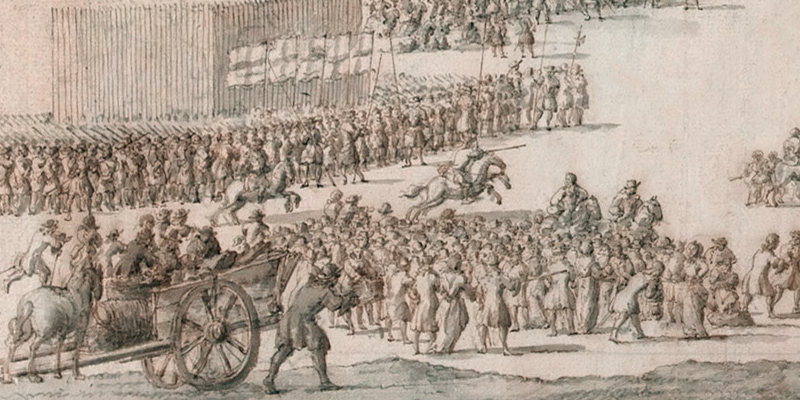Generals, Soldiers and Veterans of the English Civil War (Lecture 2/3)

Detail from 'A Grand Review on Hounslow Heath, 1687'
'The "Free-born People of This Nation": Soldiers and the State in the English Civil War'
The relationship between the soldier and the state has always been something like that of spouses in a tempestuous relationship: neither seemingly able to live with or without the other. The very existence of soldiers has depended on the state powers which raised and maintained them, whilst those same powers have throughout history been accused of ingratitude and neglect towards the soldiers who fought in their cause once a conflict was over. The problems of such a contradictory relationship have a very modern resonance to them but were nowhere more apparent than during the English Civil War.
Following on from her first lecture, with its emphasis on the senior command and high politics of the New Model Army, the focus of Dr Ismini Pells' second lecture is on the soldiers that filled the ranks of that army and their relationship with the powers they served. How did state powers mobilise men in the seventeenth century and what might we learn of popular allegiances in the Civil War? Perhaps more pertinently, what were the forces that kept those same men fighting once engaged in what was a bloody and, at times, barbaric war? In considering these questions, it must also be asked if there was ever such a thing as an ‘ordinary soldier’ and whether it is possible to cross the bounds of time to truly understand him.
With perhaps as many as one in four adult males in England mobilised for the various armies, most of English society must have known of someone directly involved in the fighting during the Civil Wars. Yet relations between soldiers and civilians were often strained. In order to sustain their armies in the field for prolonged periods, both king and parliament subjected the population to unprecedented levels of taxation. Parliament’s ability in particular to mobilise a larger share of the national product than ever before created precedents that later political leaders turned to as Britain emerged as a leading power. However, high taxation is seldom popular, and matters were compounded when communities in contested areas often ended up paying taxes to both sides, whilst also being forced to billet soldiers for free and falling victims to outright plunder.
War weariness became an inevitability as the conflict dragged on. As hostilities came to a close, pressure to disband the victorious New Model Army intensified. But the New Model was not content to go quietly. The New Model’s soldiers argued that their sacrifices entitled them not only to the arrears of pay owed to them by parliament but also a say in the way the country was to be governed in the future. Furthermore, the New Model compelled parliament to recognise their duty of care towards those wounded in their service and the families of those who had died. The success of the New Model’s interventions in state matters is apparent in the speed with which Charles II disbanded the army in 1660 to prevent such occurrences happening again.
Become a Member
Enjoy exclusive Members events, subscription to 'Muster Magazine', free entry to exhibitions, exclusive curatorial tours and historical walks.
